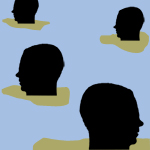We are born into this world profoundly alone, our strange, unbounded minds trapped in our ordinary, earthwormy bodies—the condition that led Nietzche to refer to us, wonderingly, as “hybrids of plants and of ghosts.” We spend our lives trying to overcome this fundamental separation, but we can never entirely surmount it. Try as we might, we can’t gain direct access to other people’s inner worlds—to their thoughts and feelings, their private histories, their secret desires, their deepest beliefs. Nor can we grant them direct access to our own. [Schulz, 2010, p 252]
The feeling of separateness from other people, so eloquently expressed by Kathryn Schulz in her book, Being Wrong, is rooted in a theory which almost all of us learn at our mother’s knee between the ages of three and six—the theory of other minds.
Human beings are self-conscious creatures. Your brain supports a model of the world, part of which is a model of yourself. When you were around four, your self-model became sophisticated enough to support a secondary, higher-level model—a model of your model of the world, and within that, a model of your model of yourself. You began to draw the subjective-objective distinction. Or to put it more simply, as Kathryn Schulz has, you realized you could be wrong about things. Reality was not always the way you perceived and believed it to be. Continue reading “The Separateness of Persons”

